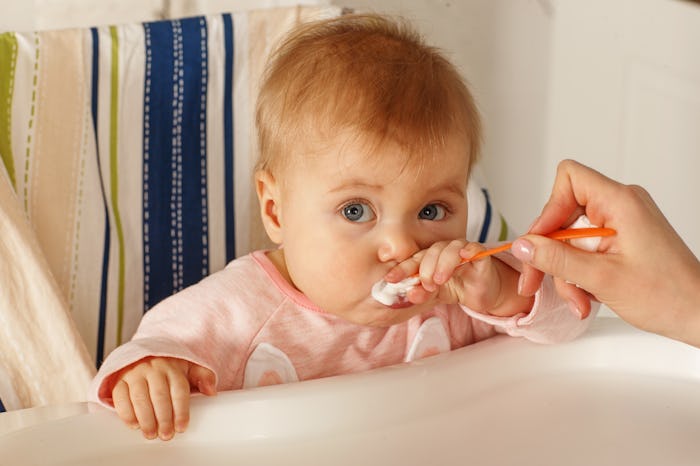Life

Is Your Baby Ready To Eat With A Spoon? (The Answer Is Probably Yes)
Whether it’s by bottle or breast (or both), you’ve been solely responsible for feeding your baby. But now, your not-so-little one is showing signs that she might be interested in using a utensil, and there’s no better introduction to fine dining than a spoon. So when do you teach your baby to use a spoon? While it might be sooner than you think, be prepared for a long process.
You can cue the cutlery for your cutie right about the time when your baby begins eating solid food. "You can introduce spoons to your child as soon as you start solid foods,” Melanie Potock, MA, CCC-SLP, a pediatric feeding specialist, tells Romper. “You’ll still be spending a lot of time spoon-feeding your baby, but early and consistent exposure to self-spooning can really go a long way.”
In fact, giving your baby early access to a spoon can be beneficial. Not only does it promote independence, but it allows your baby to discover foods in an entirely new way. “It can boost the development of oral motor skills like moving food around with their tongue and teeth, sensory development such as exploring textures, and even a relationship with speech development,” says Potock. “Studies show that mouthing objects —spoons and otherwise — helps prepare babies’ mouth muscles in ways that mirror speech and language.” And if you’ve got a teether on your hands, having a spoon can help with their itchy gums. “Many babies love the feel of a spoon in their mouth, and enjoy the feeling of biting down on one,” says Potock.
So how do you know when your baby is really ready to spoon-feed? “Your baby should be able to sit upright independently, hold her head straight, and learn to open her mouth when a spoon is brought there,” Jessica Irwin, M.S., OTR/L, RYT, a pediatric occupational therapist, tells Romper. “It is very important that your baby is able to sit up independently before trying spoon-feeding because you want her head and neck to remain upright for safe swallowing.” And make sure that your baby stays seated while she’s using the spoon to avoid potential injury.
Your baby’s first feeding efforts are really less about nutrition and more about learning important skills like hand-eye coordination and the overall mechanics of feeding. And brace yourself, momma, because mealtime is about to get super messy. “Even if she doesn’t use the spoon correctly, it can be a great way to get her comfortable with utensils, especially as she masters finger foods and grasping objects,” Janel Funk, MS, a registered dietician, tells Romper. “It’s good to give her the opportunity to play and explore with the spoon so she begins to get comfortable with it.”
Your baby’s success with a spoon also largely depends on what you’re serving — and how. “Use a shallow bowl with a low lip,” advises Potock. “And serve soft, sticky foods that can be scooped more easily.” So while your baby is learning to use her spoon, skip the soup and offer her foods like oatmeal, thick yogurt, mashed potatoes, cottage cheese, or mashed veggies.
Letting your child self-feed can be a frustrating process (for the both of you), but hang in there. By offering your baby support and being patient, you’ll teach her independence, and how sweet it can be when she can finally eat her applesauce all on her own.
Experts:
Melanie Potock, MA, CCC-SLP, pediatric feeding specialist
Jessica Irwin, M.S., OTR/L, RYT, pediatric occupational therapist
Janel Funk, MS, registered dietician